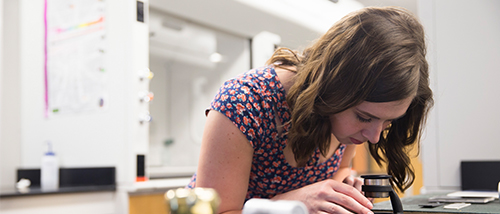Forensic Chemistry
Continue to main content
Forensic Chemistry Degree Map
Explore the courses you'll need to complete your Forensic Chemistry degree.
Forensic Chemistry Outcomes & Careers
-
$75k
Forensic Science Technician
According to the Bureau of Labor Statistics, the mean annual salary for a forensic science technician is $75,260.
-
$95k
Chemist
According to the Bureau of Labor Statistics, the mean annual salary for a chemist is $95,940.
-
$111k
Chemist & Materials Scientist
According to the Bureau of Labor Statistics, the mean annual salary for a chemist and material scientist is $111,410.
As a forensic chemistry major, you’ll prepare for careers in forensic science or chemistry. You’ll complete a minimum of 120 credit hours to complete this degree, including the general education requirements and at least 39 senior division hours. A minor is required.
“Critical Courses” are italicized and bolded. Data shows that students who have completed this course in the first two years and have earned the noted grade are most likely to complete this program of study.
Required Courses:
- CH184 General Chemistry I Lab (1)
- CH185 General Chemistry I (3)
- CH186 General Chemistry II (3)
- CH187 General Chemistry II Lab (1)
- CH195 Chemistry Seminar I (1)
- CH271 Foundations of Analytical Chemistry (5)
- CH295 Chemistry Seminar 2 (2)
- CH306 Inorganic Chemistry (3)
- CH341 Found of Organic Chem (4)
- CH342 Organic Chemistry Lab I (1)
- CH360 Polymer Chemistry (1)
- CH495 Chemistry Seminar 3 (1)
- CH531 Found of Biochemistry (3)
Forensic Chemistry Option:
- CH313 Physical Chemistry Laboratory (3)
- CH343 Advanced Organic Chemistry (3)
- CH420 Forensic Chemistry (4)
- CH533 Biochemistry Laboratory (2)
- CH575 Chemical Instrumentation (4)
- EV460 Introduction to Toxicology (3)
- FS351 Criminalistics (3)
- FS550 Forensic Microscopy (2)
- FS553 Analysis of Pattern Evidence (3)
- MA423 Statistical Analysis for Forensic Science (3)
- Choose 3-4 hours of CH or FS electives (300-500 level)
Choose one course:
- CH311 Foundations of Physical Chemistry (4)
- CH312 Advanced Physical Chemistry (3)
Additional Requirements:
- MA140 Analytical Geometry and Calculus I (5)
- MA145 Analytical Geometry and Calculus II (4)
- PH120 Introductory Physics I (5)
- PH121 Introductory Physics II (5)
OR - PH230 General Physics I (5)
- PH231 General Physics II (5)
- Social and Behavioral Sciences – 6 hours
- Constitution Requirement – 3 hours
- Written Communication – 6 hours
- Oral Communication – 3 hours
- Natural Sciences – 7 hours (from two disciplines, one to include a lab)
- Mathematics – 3 hours
- Humanities & Fine Arts – 9 hours (from at least two disciplines)
- Additional requirements – 5 hours (to include UI100 for native students)
- Civics examination
First Year
Fall Semester (14 Hours)
- UI100 (1)
- EN100 (3)
- CH184/185 (4)
- CH195 (1)
- MA140 (5)
Spring Semester (14 Hours)
- CH186/187 (4)
- MA145 (4)
- General Education (3)
- General Education (3)
Milestone: Maintain 2.0 cumulative GPA
Second Year
Fall Semester (15 Hours)
- CH271/071 (5)
- CH341 (4)
- CH342 (1)
- PH120/020 or PH230/030 (5)
Spring Semester (16 Hours)
- CH295 (2)
- CH343 (3)
- PH121/021 or PH231/031 (5)
- General Education (3)
- General Education (3)
Milestone: Maintain 2.0 cumulative GPA
(Summer courses are encouraged to avoid 18 hour semesters)
Third Year
Fall Semester (17 Hours)
- CH306 (3)
- CH360 (1)
- CH420 (4)
- CH531 (3)
- FS550 (3)
- General Education (3)
Spring Semester (14 Hours)
- CH533 (2)
- FS351 (3)
- MA423 (3)
- General Education (3)
- General Education (3)
Milestone: Maintain 2.0 cumulative GPA
Fourth Year
Fall Semester (15-16 Hours)
- CH311 or CH312 or CH/FS elective (3-4)
- EV460 (3)
- FS553 (3)
- General Education (3)
- Elective (3)
Spring Semester (12-15 Hours)
- CH311 or CH312 or CH/FS elective (3-4)
- CH313 (3)
- CH495 (1)
- CH575 (4)
- Elective (1-3)
Milestone: Maintain 2.0 cumulative GPA
A “Milestone” signifies a significant stage for a student in the completion of a degree.
What will it cost?
Become a Redhawk.
Do more than dream about the future. Take the first steps to make it all happen.
“ I am a chemistry major with an emphasis in forensics. A few of my classes are taught by adjunct faculty who work at the local crime lab. This is awesome because it really helps to learn from individuals who are experienced in the field. ”
Department of Chemistry and Physics
One University Plaza, MS 6400
Cape Girardeau, MO 63701
